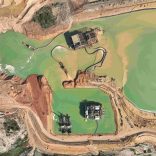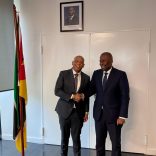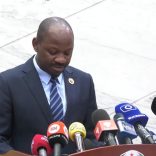Mozambique: Kenmare Resources advances upgrades to wet concentrator plant
Sasol hit by a confluence of once-off items

Lower volumes were secured from Secunda Synfuels Operations in a challenging retail liquid fuels market. Picture: supplied
Petrochemical company Sasol has reported worse than expected results for the year to June. While the higher dollar price for oil was a benefit, this was offset by a stronger rand and hedging losses mainly due to oil put options.
Once off adjustments include the impairment of the vinyls and PVC business, partial impairment of the Mozambique production agreement due to lower than expected oil volumes, and of the Canadian shale gas assets and the scrapping of US gas-to-liquid assets.
Other charges include R3 billion on the Khanyisa black economic empowerment transaction, ramp-up depreciation of the new chemicals project in the US and the effect of strike action at Sasol Mining and electricity supply interruptions.
These are all reflected in a slump in operating profit to R17.7 million from R31.7 million in 2017.
Earnings before interest, tax, depreciation, and amortisation were up 10% to R52 billion, core headline earnings decreased by 6% to R36.03 per share while headline earnings a share were down 22% to R27.44, with the difference reflecting depreciation of R16 billion and employee share-based payment expenses of R1.5 billion due to the improved Sasol share price at year-end.
Sasol nevertheless increased its final dividend to 790c (780c) a share.
The bottom line masks to some extent higher sales and production volumes in the second half, with a 28% increase in the oil price, and the rand per barrel price increasing 20%.
Sales of Base Chemicals were down 1% due to power supply interruptions and Performance Chemicals sales were up 1% on the back of “robust market demand.” Energy liquid fuels sales were down 2% due to lower volumes from Secunda Synfuels Operations (SSO) and Natref and a challenging South African retail liquid fuels market. Production volumes at Natref were down 9% due to planned shutdowns and an unexpected electricity supply interruption at the beginning of the year, but the second half yielded better production rates. Production volumes from SSO decreased by 3%.
Eurasian operations increased production volumes by 3% due to stronger product demand and increased plant availability, while
ORYX GTL, the 49%-held gas-to-liquid plant in Qatar, delivered a strong production performance.
The group’s big project – the Lake Charles Chemicals Project (LCCP) in the US, which Sasol expects to be “a catalyst for transforming our earnings profile,” is 88% complete, on schedule, and costing $11.13 billion.
Capex of R53.4 billion included R30.1 billion on LCCP, with the funding of LCCP and investments to fund growth projects contributing to the 42% decrease in net cash to R17 billion.
Sasol raised R25 billion in loans.
Joint president and CEO Bongani Nqwababa said 2019 will be a “defining year” for Sasol with the start-up of the LCCP.
In Mozambique, the group’s other key growth area, Sasol is stepping up efforts to secure long-term gas feedstock.
Sasol is on track to start up LCCP’s first three manufacturing units by the end of December 2018. Its R14 billion mine replacement programme is nearing completion, with the Shondoni colliery underground infrastructure completed in May and phase two of the Impumelelo colliery project on track to be completed within budget late in 2019.
In Mozambique, the Production Sharing Agreement phase 1 and 2 drilling activities were also completed.
Sasol’s relationship with Ayo Technologies, previously Sekunjalo Technology Solutions and linked to Iqbal Surve’s African Equity Empowerment Investments came under scrutiny at the results conference call. Ngwababa said Ayo has secured Sasol’s networking contract with British Telecoms, and the contract is backed by BT. Following the “noise” with regard to the contract, Sasol put specific clauses in the contract. For example, if there is any misrepresentation or fronting, there is an exit clause on the contract and it goes back to BT. Ngwababa said BT people involved in the contract have moved to Ayo and as far as Sasol was concerned, it is getting the same service with the same people as it got under BT. The only change as far as Sasol is concerned is “the name on the invoice.”
Looking ahead to the current financial year, Ngwababa said management is focused on “factors within our control, including volume growth, cost optimisation, effective capital allocation, focused financial risk management and maintaining an investment grade credit rating”.
Joint president and CEO Stephen Cornell said he expects a strong operational performance in 2019 adding that Sasol continues to evaluate major acquisition opportunities, while assets valued at more than $1 billion are earmarked for divestment.
By Marcia Klein












Leave a Reply
Be the First to Comment!
You must be logged in to post a comment.
You must be logged in to post a comment.